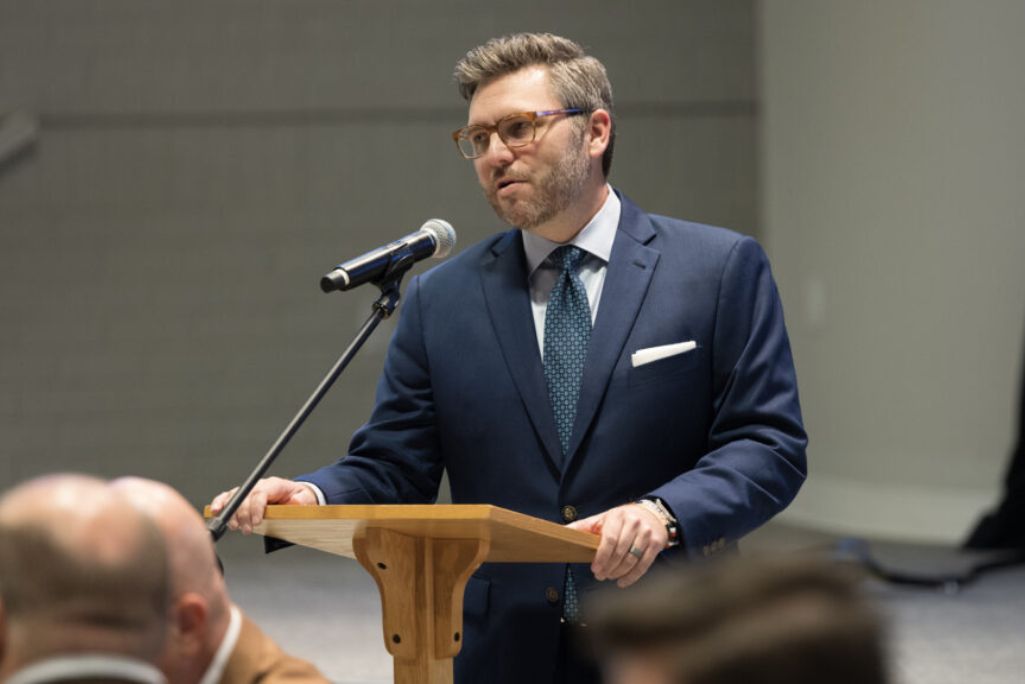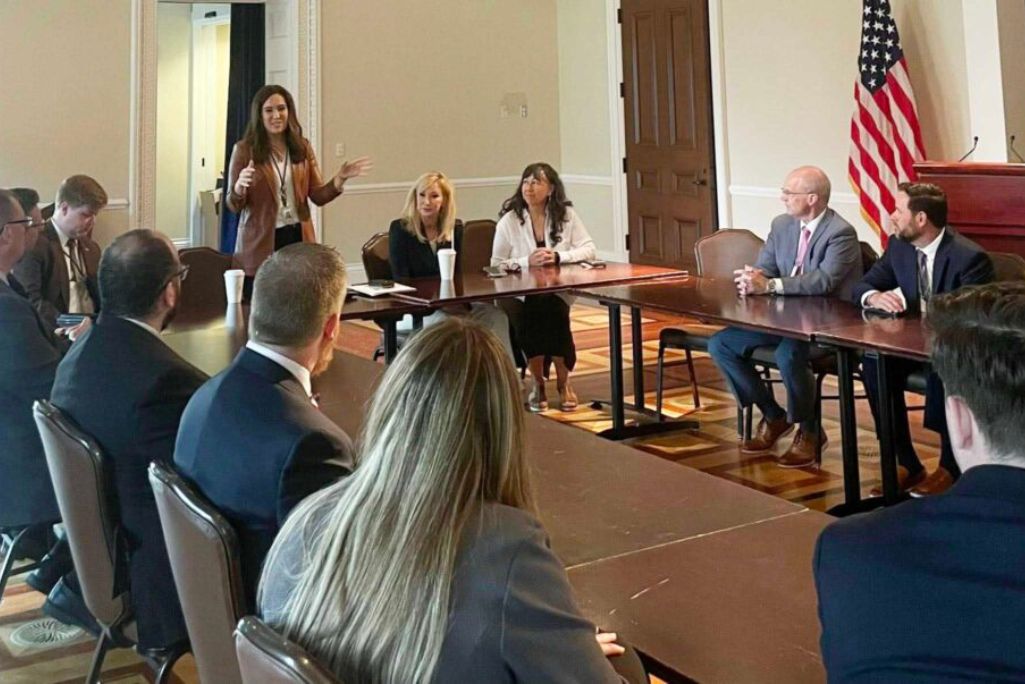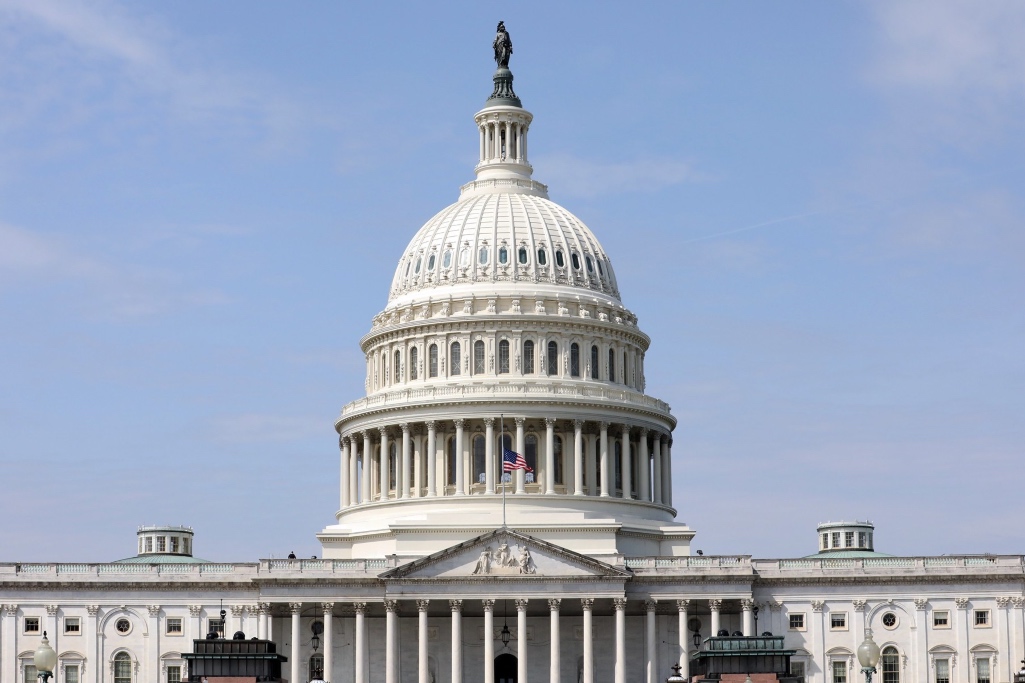
Ethics & Religious Liberty Commission President Brent Leatherwood speaks to trustees on Sept. 10, 2024, in Nashville.
NASHVILLE (BP) — Ethics & Religious Liberty Commission (ERLC) trustees issued a statement Sept. 10 affirming the “good work” of President Brent Leatherwood and his staff in a step “to acknowledge and address concerns and to create a greater sense of understanding, unity and trust” between the entity and Southern Baptist churches and among the ERLC trustees, president and staff.
The statement was released Wednesday morning (Sept. 11). Interim trustee chairman Tony Beam alerted media on Tuesday after the trustees’ second plenary session of the day, which ended in more than two hours of executive (closed) session.
Beam commended the board in its efforts to support the ERLC staff to “navigate a turbulent political climate.”
“We pray that the Advocacy Assessment and the Affirmation and Encouragement statements affirmed by the trustees will assist and encourage the ERLC president and staff in speaking clearly and boldly to the issues of the day and inform the churches in a transparent way, how the ERLC makes decisions about how they address the issues,” he said.
Leatherwood reciprocated in his comments.
“I consider it such a privilege to serve as president of this organization,” said Leatherwood, beginning his third year in the role. “I know our team feels the same way about the service we render to our churches. We are grateful for the clear affirmation of our work by the trustees. Their encouragement renews our resolve to continue advocating for Southern Baptists in the public square.”
Trustees were provided a document outlining how the ERLC goes about assessing whether to engage in an issue. Seven questions provide guidance:
- Is this an issue for which we have a biblical basis to speak?
- Is this an issue on which the Baptist Faith and Message 2000 has a clear position?
- Have Southern Baptist messengers spoken to this topic, whether through actions on the floor of an annual meeting or resolutions?
- What has been the historic position of the ERLC/Christian Life Commission (CLC) since the Southern Baptist Convention’s (SBC) Conservative Resurgence?
- Will advocacy on this issue upset certain segments of the SBC? If yes, is it still necessary to take a position/say something?
- Does our advocacy have a chance to meaningfully advance issues of importance to the SBC?
- How will this affect our relationship with non-SBC coalition partners?
“There have been moments in working through this kind of framework when we have decided not to engage,” Leatherwood said in his president’s address. “Especially when it comes to issues that our state conventions may have to deal with first. We want to be cautious about getting ahead of where the state executive, in conversations with pastors, about potential ways they may be able to resource churches there.”
Leatherwood acknowledged the tumult that came in late July when a report was delivered to media that he had been removed as president before it was made known there had never been a formal vote to do so.
“I like to think that I have pretty broad categories for what to expect at any given moment,” he said. “And even I found those events to be strange, peculiar and mind-boggling challenges.
“… I return to the counsel provided by Paul and Peter — Move forward, laboring in the gospel and not by my feeble, exhaustible strength but by the strength that comes pouring forth from the Lord. And as I do so, be known for reasonableness and not for anxiety. And when the chaos comes, be known for peace and contentment.”
The advocacy assessment document presented to trustees reflects updates and other organizational moves that were in progress prior to the 2024 SBC annual meeting in Indianapolis “to ensure that we deepen the relationships with our local churches and emphasize our service,” he added.
Although a vote in Indianapolis to abolish the ERLC failed, it served notice.
“The results … weren’t just disappointing, they were unacceptable,” Leatherwood said. “I say that not to the outrage artists and the grievous grifters who will never be on our side. … I’m talking to the local pastor and everyday church member who need to better understand our mission and the work that we do.”
Motions, new officers, budget approved
The Wednesday morning plenary session opened with another 45 minutes in executive session. Upon reconvening publicly, Beam reported the approval of two motions:
- Acknowledgement that Leatherwood’s salary had been presented to the full board by its executive committee and reviewed by the trustees as stated in the bylaws.
- Affirmation of the ERLC’s existing conflict of interest policy and encouraging trustees and staff to follow it.
“We also encourage trustees and staff to report violations of this policy,” the motion read. “Trustees who violate the conflict of interest are subject to board censure and staff subject to disciplinary action.”
The board approved its new slate of officers:
- Scott Foshie, chair, Illinois
- Amy Pettway, vice-chair, Florida
- Anthony J. Cox, secretary, Arizona
- Heather Sells, Communications chair, Virginia
- Mitchell W. Kimbrell, Research and Policy chair, Vermont
- Matthew T. Morgan, Administration and Finance chair, Mississippi
The board approved a 2024-25 operating budget of $3,297,870 million. In his report, Chief Financial Officer Bobby Reed updated trustees on $250,000 they had approved in March toward the work of the Abuse Reform Implementation Task Force (ARITF).
Those funds were sent to the Executive Committee to perform its fiduciary duty in disseminating them to the ARITF. However, they were never used by the task force before it disbanded following the annual meeting. Those funds were then returned to the ERLC.
Reed also addressed allegations of liberal organizations and the ERLC.
“There is a narrative that a large amount of funding is coming from billionaire sources,” he said. “This is blatantly false and anyone who says that is lying.”
Funds outside of the ERLC’s Cooperative Program allocation “of any consequence” have been for the Psalm 139 Project and the Life Collective work launched separately from the ERLC.
“I want to be on the record and very clear — that is the truth and if you want more information about that, I’m [available],” Reed told the board.
“There are people who make claims that they have the receipts. I literally have the receipts.”
Actions on referred motions, outgoing trustees honored
The board addressed five motions referred from the 2024 SBC annual meeting:
- Trustees declined to take action on a motion brought by Joe Sneed from First Baptist Church in Rockwall, Texas, calling on the ERLC to issue a formal apology to the SBC Executive Committee for allegations of a sexual abuse cover-up made by the ERLC’s former president.
- Paul Montgomery of First Baptist Church in Crescent City, Okla., requested that all SBC entities only use legal counsel whose values are not in conflict with the Baptist Faith and Message. The board responded that all vendors and service providers are carefully measured in “the balance between good stewardship, quality service, specialized expertise and a witness for Christ.”
- Jonathan Parramore of Christ Community Church in San Jose, Calif., asked all entities to revise their code of conduct “to life prohibitions” on the moderate consumption of alcohol outside of communion. ERLC trustees cited the staff handbook’s “broad Scriptural principles” that “would not require adjustment related to this motion.” Such issues, the board added, are best addressed at local churches such as the ones where ERLC staff “are active members.”
- As it is not within the ministry assignment of the ERLC, the board declined to take action on a motion referred to all entities from Curtis Kentmer of Central Baptist Church in Paris, Ky., to explain how Calvinism/Reformed theology is compatible with the Baptist Faith and Message.
- Ethan Hester of Pleasant Grove Baptist in Marion, N.C., asked that messengers at the annual meeting direct the SBC Executive Committee to publish a schedule of payments of more than $5,000 made by any entity to or on behalf of any cooperating church to the convention, its pastors, their spouses, or associational missionaries or their spouses. As the motion was directed at another entity, the board said, no further action was necessary by the ERLC.
Todd Brooks (Oregon) and Jon Nelson (Missouri) were voted into the seats vacated, respectively, by Michael Lerma (Washington) and Kevin Smith (Florida).
Outgoing trustees completing their service next spring were honored. They are Todd Howard (Arkansas), Jonathan Whitehead (Missouri), Tony Beam (South Carolina) Janeé England (Nevada) and Jimmy Patterson (Georgia).
The trustees board will gather again on April 10, 2025, on Zoom.
(EDITOR’S NOTE — Scott Barkley is chief national correspondent for Baptist Press.)


